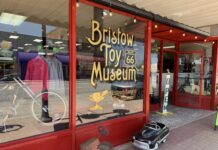In the lyrics to the song, “The Lower 48,” by alternative country band The Gourds, singer Kevin Russell assigns brief, one or two sentence descriptions to each of the 48 contiguous states. When he comes to Oklahoma, he sings “Oklahoma is a dirty red mean/Native American slot machine.” As with most songs by the band, Russell sings the lyrics with a twinkle in his eye and his tongue planted in his cheek. But the line also reflects a wider perception of Oklahoma, that of a state that is heavily populated by American Indians and whose economy is primarily fueled by casinos.
Data from the 2010 U.S. Census shows 321,687 Oklahomans identified as Native American, or about nine percent of the state’s total population, good for third among the state’s racial groups, after white and Hispanic/Latino. Not bad, but not exactly as the song would suggest. As for casinos, they are definitely becoming a more common sight across the state, and they are an increasingly vital component to the state’s economy. But they are only one part of the growing network of Native American tribal businesses that are helping to make Oklahoma’s economy one of the healthiest in the nation.
Diverse Interests
“We’re much more than just a gaming tribe,” says Judy Allen, public relations director for the Choctaw Nation. “We’ve got a tremendous focus right now on culture and heritage job development and diverse markets. For instance, one of the things that we’re doing is a large print business here in the Choctaw Nation. We were named one of the top 400 printing businesses this year with Texoma Print Services.”
The idea of expanding beyond established economic opportunities has become a routine practice among Oklahoma tribes. It’s a practice that is benefitting the individual tribes and their surrounding communities, as each business entity creates jobs for Oklahomans.
“One of the things we’re doing is looking really hard in the areas of government contracting, especially with 8A,” says Creek Nation Chief George Tiger, referring to the federal business development program. “We haven’t been as aggressive as we should be. And we’re certainly going to be doing that because I believe we’ve missed out for too long. 8A is something that a number of tribes are getting involved with.”
Oklahoma Native American tribes are diversifying. Health care has always been a major focus of tribal economies, but tribes are now expanding into telecommunications, manufacturing and production, aerospace and oil and gas services. Any industry that gives a tribe a chance to grow economically is a target. Even sweets.
“We have a chocolate, confectionary business that decorates chocolates. We just built a new plant, relocating from our site near Pauls Valley to a brand new plant at the intersection of I-35 and State Highway 7,” says Neal McCaleb, Chickasaw Nation Ambassador at Large and Chairman of the Board of Chickasaw Nation Industries. “The tribe has other economic enterprises besides gaming, like our bank, which has been very successful. We’re the second largest lender through the FHA 184, which is a special FHA program for Native Americans. We are second only to Wells Fargo, which is a huge bank, and ours is just a little community bank.”
“In our other businesses (besides gaming) we had a 60 percent increase last year,” says Cherokee Chief Bill John Baker. “We are diversifying, we are doing a better job at our outside businesses. We averaged over a million dollars a day in our 8A businesses and outside contracts last year alone.”
Major Impact
In October 2012, Oklahoma City University’s Steven C. Agee Economic Research and Policy Institute published The Statewide Impacts of Oklahoma Tribes. According to the study, the 38 federally recognized Native American tribes in Oklahoma combined to generate $10.8 billion to the state’s economy, or roughly seven percent of the state’s $148 billion in economic production. Tribal entities employ more than 50,000 Oklahomans, both tribal members and non-members, with payroll figures in excess of $1.5 billion. These figures represent tribal entities, but not privately owned Native American businesses, such as TERO contractors, who are largely Native American owned and who largely employ Native American workers.
“We’ve got a new housing program that we’re literally trying to build 100 percent with Cherokee contractors, Cherokee materials, Cherokee everything,” says Baker. “And it’s going to have a huge economic impact that is really outside of the government.”
“We don’t count those TERO dollars in our economic impact, but clearly that’s Native American in a ripple effect,” adds Amanda Clinton, Cherokee Nation communications director.
Gaming Pays Off
Still, in the end, the largest economic impact remains the gaming industry, which includes the casinos, casino hotels and resorts. According to the Steven C. Agee report, gaming generates an estimated $4.8 billion in revenue, more than six times that of all other tribal industries combined.
“We’re taking the next $100 million from gaming, and we’re going to build a new hospital, add on to two clinics and build two brand new clinics that won’t be financed, and there will be no payback on,” Baker says. “And we can make health care in the Cherokee Nation world class by making this $100 million investment.”
Across the state, Native American-owned casinos have emerged as leading destinations for visitors from around the country. Major gaming facilities include the Cherokee Nation’s Hard Rock Hotel and Casino in Catoosa, Winstar World Casino in Thackerville and Riverwind Casino in Norman operated by the Chickasaw Nation, the Muscogee (Creek) Nation’s River Spirit Casino in Tulsa, Downstream Casino & Resort operated by the Quapaw Tribe, the Citizen Potawatomi Nation’s Grand Casino in Shawnee and the Osage Nation’s Osage Casinos. And there are dozens of smaller gaming facilties throughout the state.
As gaming has become the most vital fuel in the economic growth of Oklahoma’s Native American tribes, the tribes themselves have become experts in the gaming industry.
“The Cherokees, we’ve always tried to be top of the market,” says Baker. “We’ve tried to be in front of everybody else. We always try to have the absolute best entertainment experience. We try to have the best hotel rooms. If folks are going to come, and it’s going to say Cherokee, then we want it to be the absolute top of the market.”
That quest for excellence drove the Cherokees to adopt the Hard Rock brand in 2009 along with a host of upgrades to the Catoosa location. Other tribal governments are also doing their homework and strategically expanding gaming operations in ways that make the most economic sense and serve to expand, rather than saturate the gaming market.
Muscogee (Creek) Nation Casinos recently announced a $250 million dollar deal with Margaritaville to bring that brand to its Arkansas River property in Tulsa. The project will dramatically transform the area with a new casino and 22-story, 500 room hotel and a theater and event center among other amenities.
Osage Casinos, which contributed a record $38 million to the tribe in 2012, has adopted a plan to expand all seven of its casinos, spending around $9 million on each facility over the next several years. The flagship Tulsa location has received upgrades, while the Sand Springs facility got a major makeover, including a new bar and dance floor and sit-down restaurant. Construction is under way in Skiatook and Ponca City to dramatically reinvent those properties with expanded casinos, and full-service hotels.
The Quapaw Tribe recently completed expansions to Downstream Casino, which straddles the Oklahoma, Missouri and Kansas borders and draws customers from a broad geographical region. The Kappa Tower expansion added 152 rooms, including 16 luxury suites to the casino’s inventory, along with a new spa and indoor swimming pool.
Just north of the Oklahoma-Texas border, the Chickasaw Nation is rapidly expanding what is already the world’s third largest casino, continuing to play on the luxury global travel theme that has already served it well. The Winstar World Casino unveiled a new entry, Paris-themed casino and several new amenities late last year, and construction of an additional, 18-story, 500-room hotel is in the final stages.
The Citizen Potawatomi Nation has also upgraded its major casino property just outside of Oklahoma City in Shawnee. The tribe rebranded the facility as the Grand Casino Resort last year and opened the full-service, 262-room Grand Hotel in July. Construction is also underway on new dining options, a pool and lounge and a 2,500-seat event center.
These are only a few examples from some of the larger facilities around the state. There have also been significant additions at smaller casinos and gaming centers in every corner of Oklahoma. The growth of gaming and the bullish expansion in a broad spectrum of industries point to a bright outlook for Oklahoma’s native tribes and likely a growing share of the state’s economic output.

























